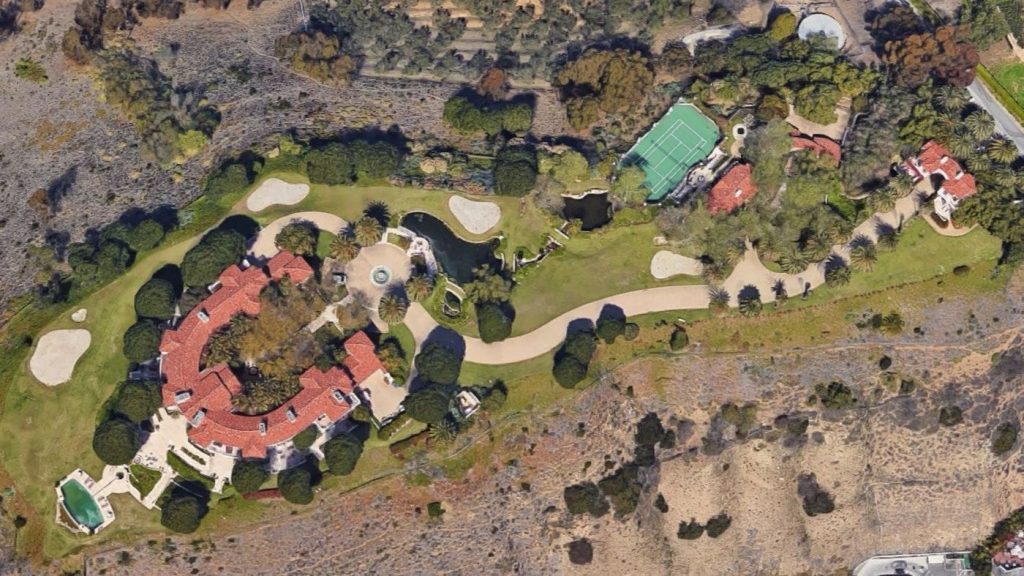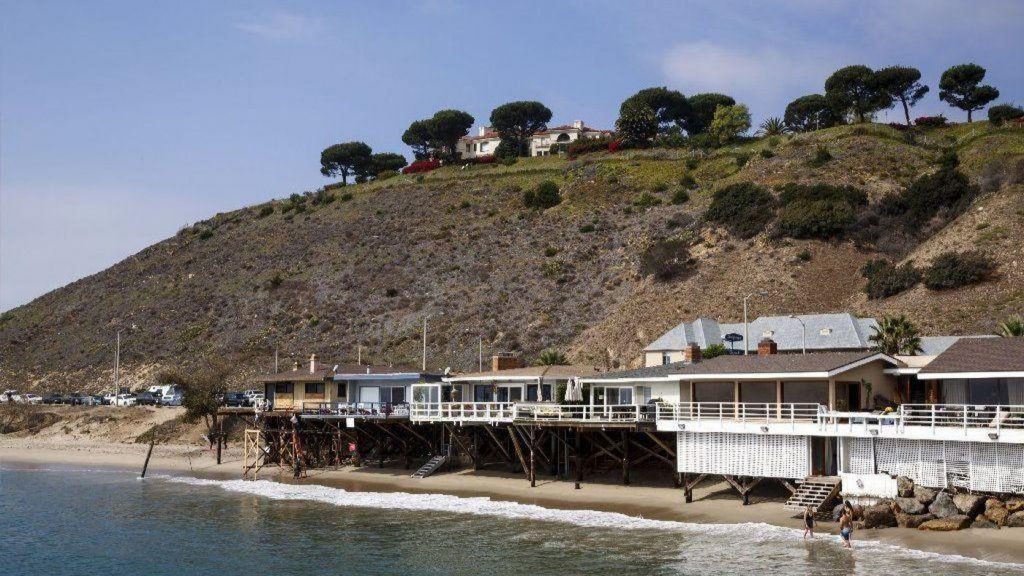When the bluff-top mansion at the end of Malibu’s Sweetwater Mesa Road sold for more than $30 million in 2016, it looked like the end of a years-long intrigue involving the playboy son of the president of an oil-rich African nation.
Instead, the sale and a quick flip of the property for nearly $70 million has opened a new, scandalous chapter. This time, instead of an accused kleptocrat and the U.S. Department of Justice, the key players are a celebrity real estate broker and an insurance company.
In a lawsuit that a federal judge recently ruled can proceed, Mauricio Umansky, chief executive of high-end Beverly Hills real estate firm the Agency, is accused of selling the home for millions less than it was worth because he had partnered with the winning bidder, allowing the pair to maximize their profits when they resold it less than a year later.
The insurer, Western World, sued after it looked like it might be on the hook to pay $3 million as part of a potential settlement between Umansky and the original seller, the son of the president of Equatorial Guinea.
If Western World’s accusations prove true, it could mean that Umansky shortchanged charities in the Central African nation out of millions of dollars they should have received as part of a deal struck between the home’s former owner and the Justice Department.
Umansky and his firm have denied any wrongdoing, saying that Western World is trying to improperly cancel a policy and that the lawsuit contains “unnecessary and scurrilous allegations.”
“Mr. Umansky did exactly what he was retained to do,” attorneys for Umansky and the Agency wrote in a court filing. “He sold the Sweetwater property with virtually no publicity, under a strict deadline and at a price above the appraised value.”
In a statement to The Times, an attorney for Umansky and the Agency added that his clients are “vigorously defending themselves against this frivolous lawsuit … and are confident that they will prevail at trial.” They’re also countersuing Western World for breach of contract.
The tale of 3620 Sweetwater Mesa Road began in 2011 when the Justice Department sought to seize the property and other assets — including a Ferrari, a private jet and the jacket Michael Jackson wore in the “Thriller” music video — from Teodoro Nguema Obiang Mangue, the son of the president of the African nation.
Located within the gated Serra Retreat, the property’s centerpiece is a Spanish-hacienda compound reached by a winding driveway lined with palm trees. A circular motor court and a pond sit at the end of the drive; a three-hole golf course replete with fairways, greens and sand traps surrounds the home.
Topped with a clay-tile roof, the hulking horseshoe-shaped home built in 1991 has 15,000 square feet of interior space, six bedrooms and eight bathrooms. There are multiple guest houses plus a guard house, a tennis court and a swimming pool.
Like many ultra-luxury properties in Los Angeles County, the mansion has been owned by entertainment elite. Before Obiang, who acquired it in 2006, it was owned by Karen Rabe, a member of the King World Productions family, which syndicated “Wheel of Fortune.”
The Justice Department alleged Obiang, now his country’s vice president, bought the house and other assets by pilfering the proceeds of oil and natural gas sales in his country, ultimately amassing wealth of more than $100 million.
In 2014, as part of a settlement with the department, Obiang agreed to sell the Malibu mansion, with $10.3 million of the proceeds going to U.S. officials and the rest to be distributed to charities benefiting the people of Equatorial Guinea.
The next year, Obiang and the U.S. government selected Umansky to sell the property. The seller, Sweetwater Malibu — a limited liability company controlled by Obiang — insisted that the property not be advertised and the sale happen quietly, according to Fredric Trester, an attorney representing Umansky and the Agency.
Umansky got five offers, and Sweetwater settled on one for $33.5 million from Mauricio Oberfeld, a developer of luxury homes. Oberfeld would eventually buy the house in 2016 for $32.5 million after asking Sweetwater for a discount because of repairs that needed to be made at the property, which had been vacant.
Oberfeld then turned around and sold the house nine months later for $69.9 million, more than double his purchase price. And he had a partner in the deal: Umansky, a longtime business associate who invested alongside Oberfeld in the 2016 purchase and listed the home in 2017. Western World alleged Umansky did not disclose his investment until shortly before the sale closed.
Sweetwater cried foul. In a letter to the Agency that summer, an attorney representing Sweetwater demanded private mediation, saying it appeared Umansky had used his position as both broker and buyer to get a deal that favored himself over Sweetwater.
Later, Sweetwater added a more explosive allegation: that Umansky pushed the sale to Oberfeld and recommended the $1-million discount, despite knowing that another potential buyer was interested in the property and was willing to pay $8 million more than Oberfeld.
It’s unclear what motivations Sweetwater had for initiating the dispute, given that proceeds from the sale would flow to third parties. But the limited liability company said it would be willing to settle with Umansky for $8 million, noting the Agency was insured for up to $3 million.
Attorneys for Sweetwater did not return calls for comment.
Umansky and the Agency turned to the insurer to pay for their legal defense in what at the time was a private proceeding. Instead, the insurer sued Umansky and the Agency in June, essentially siding with Sweetwater and arguing it should be able to cancel its insurance policy. The lawsuit made the allegations public.
At the heart of the dispute is an apparent offer from real estate investor Sam Hakim. Sweetwater and Western World allege that, after Oberfeld’s offer of $33.5 million was accepted, Hakim offered to pay Oberfeld $8 million to take over the bid — suggesting Hakim thought the property was worth at least $41.5 million.
They also allege Umansky never told Sweetwater or the U.S. government — which had to sign off on the eventual sale — about the offer from Hakim, even as the broker pushed for Sweetwater to agree to Oberfeld’s demand for a discount.
“The failure of [the Agency] and Umansky to disclose the negotiation between Oberfeld and Hakim … was an obvious violation of fiduciary duties,” Western World alleged.
Trester, Umansky’s attorney, confirmed that another potential buyer approached Oberfeld during the sale process — he did not name Hakim — but said discussions were never serious enough that they needed to be disclosed to Sweetwater.
“During the time property was under contract with Mr. Oberfeld, a non-binding letter of intent was delivered to Mr. Oberfeld to assign his position in the contract,” Trester said. “Because the letter of intent was non-binding, it had no legal significance. Mr. Oberfeld nevertheless countered the non-binding letter of intent, but the individual never responded with an offer.”
Aitan Segal, the real estate agent for Hakim named in the lawsuit, declined to comment.
Trester also said Umansky asked Sweetwater and federal officials for permission to invest with Oberfeld. Thom Mrozek, a Justice Department spokesman in Los Angeles, confirmed that the department approved Umansky as the listing agent. However, he could not confirm that the department approved Umansky’s investment in the property, noting that the federal agency is not involved in the dispute over the sale.
Umansky’s attorneys sought to have several of Western World’s allegations stricken, arguing they were “repetitive, immaterial, impertinent and/or scandalous.” That included allegations that Umansky breached his duty to Sweetwater by not reporting the offer from Hakim even as he was recommending Sweetwater agree to Oberfeld’s demand for a lower price.
The case, before federal District Judge George Wu, will proceed once Umansky and the Agency file their response to Western World’s allegations.
The dispute has brought renewed attention to the mansion, now owned by a company registered in the British Virgin Islands. It was last in the spotlight in 2016, during the short period that Oberfeld and Umansky owned it.
Umansky’s wife is Kyle Richards, a cast member of “The Real Housewives of Beverly Hills,” the popular Bravo network reality TV show. The house was the site of a Great Gatsby-themed party.
“We chose the Great Gatsby theme because the Malibu property feels so grand, and we thought the 1920s is all about excess, with alcohol and the money flowing,” Richards said in the episode.
http://www.latimes.com/business/la-fi-umansky-sweetwater-20180930-story.html#






This is real estate porn at its porniest.
I think if we made it more difficult for third world hellhole new money Jethro’s to acquire properties like this, or anything, until vetted like the IRS would vet any suspected criminal, we’d have less time wasted governing these inbred idiots, and the homegrown predatory weasels who exploit Jethro’s supreme ignorance and no less than satanic greed.
soooo……
crooks stealing from each other, is that the message here?
Not sure why someone who makes $30 million gross profit in months decides to counter-sue over $3 million, and risk it all going public.
Private Profit, Public Loss. I’m sure eventually, somehow the U.S. taxpayers and the people of Equatorial Guinea will be the ultimate losers in this transaction.
The criminals will just get a slap on the wrist fine and everyone will move on, until the next boondoggle.